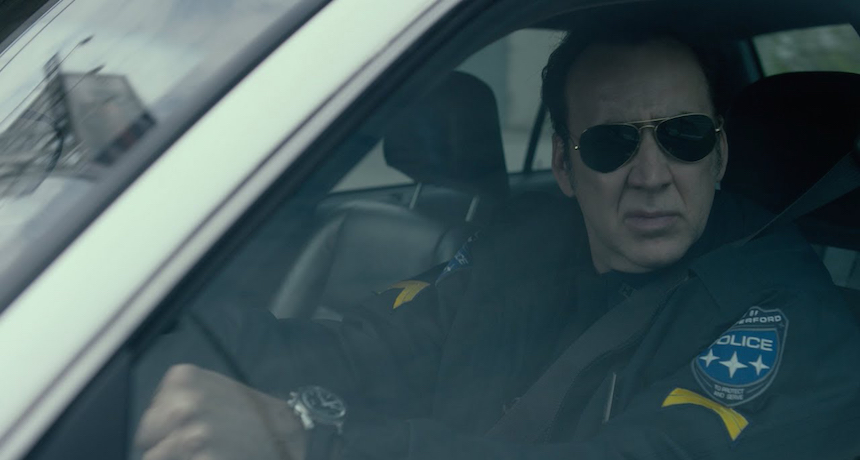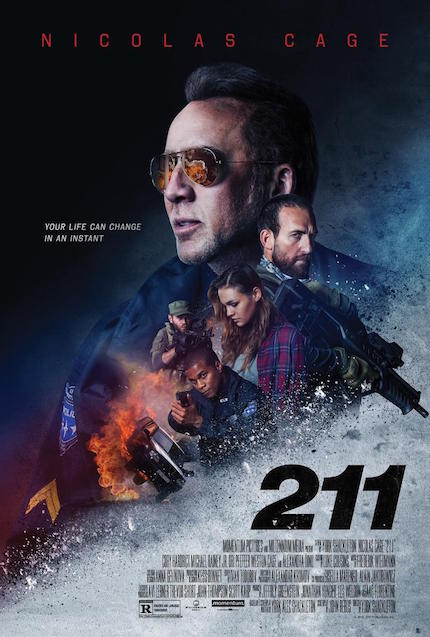Interview: 211 Director York Shackleton on His Bank Heist Film

In York Shackleton's bank heist/action film 211, a group of soldiers from the special forces get fucked up by their boss, who doesn’t pay them for their (dirty) work.
We also follow a young African American student who gets bullied at school and ends up being punished for acting in self-defense.
Last but not least, there’s Nicolas Cage’s character, an experienced cop, soon to become grandfather, who works together precisely with his son-in-law.
These three storylines come together when the soldiers decide to rob a bank in order to get the money that was owed to them. As you would expect, the heist turns messy and violent, with innocent people getting involved and Cage’s cop forced to become a hero.
To dig more into 211, which hits theaters, VOD and Digital HD on June 8, here’s the conversation I had with writer/director York Shackleton.
ScreenAnarchy: 211 is a heist movie told from different perspectives. How did you came up with this idea of doing an action film with an ensemble cast?
York Shackleton: For me it all started with the subject matter first. We wanted to chose a really strong, self-contained action movie, basically in one location, but we also, as storytellers, have to have those dramatic elements in there. Once we made the decision, I was able to start to create characters and subplots for the film that I felt would give a very broad demographic and many different people could relate to the situations through a different character in the movie.
The main antagonists are peculiar for a heist movie because they’re soldiers from the special forces who were used by a corrupt businessman. How was the origin of this notion?
In North Hollywood, California, about 15 years ago, a bunch of guys went into a Bank of America and they robbed it. They had fully automatic weapons and body armor. The police at the time didn’t have that kind of weaponry so they were having a very difficult time stopping these guys. There were a number of casualties and it was a very big deal that changed law enforcement in the United States forever. I mean, police now carry AR-15s because of this situation.
It wasn’t as much about telling that story, but it gave me background and inspiration. We started to realize that there’s a big cult following behind the situation, there were a lot of people who were speculating on who these guys were, some talked that they might be ex-military, so I thought what a great opportunity as a writer to be able to take some liberties of the story because there were still so many unanswered questions as to who these guys really were.
Aside from this story, there’s also the character of the young student who basically brings issues that are so relevant nowadays, like bullying and even the racial conflict in the United States. How important was for you to tackle these issues in a genre movie?
I think is important to keep your films as well-rounded as possible. I like to try to stay very close to what’s happening in society because I think people can relate to that and helps them get lost in the journey of the film. But I also don’t want to put my opinion to these films, so I’m trying to show that situation for what it is and not really from one side or the other. I tried to keep it very ambiguous and just show that this kid was being bullied, he fights back to protect himself and he ends up getting in trouble and he’s now doing a ride along with some policemen. Obviously we have a lot of issues with law enforcement these days, but I just wanted to show the situation because I think there’s a lot of duality in all people and no one is just one way. I wanted to see many different people trust into a situation like a shootout.

There's a lot of action and violence but the film is also quite emotional with the pregnant wife and the mother of the young student. How was the development of the human aspect of the script?
I think that’s what filmmaking is all about. When I was younger I would leave the theater and I remember people would always be talking about the movie, there was a lot of conversations and ideas. I noticed these days it doesn’t happen as often. That’s all I kind of understand as a filmmaker; the fundamental of what we do as artists is moving people emotionally using pictures and sound. I always try to stay true to that.
211 could be seen as a buddy cop film, and again it's peculiar that you have a cop [Nicolas Cage’s character] who is working with his son-in-law. Can you comment on this decision?
I wanted to find as many opportunities to link the storyline together and create the human element. That gave us a really great opportunity to raise the stakes and to allow for the situation when someone is shot and his partner is trying to save him. It just raises the stakes there and makes it much more frightening. I feel like we have to try to find those situations to put the audience on the edge of their seats.
Did you have any particular film influences for 211?
I watch a lot of films within the genre I’m working at the time. Obviously Traffic, End of Watch, movies about law enforcement and real life situations where they were able to really capture the realistic elements of it all, almost within a documentary style. I studied a lot of films like that, looking at many different reasons of why they work and why they don’t work in certain areas.
You’re working with the living legend Nicolas Cage. How did that come together initially?
Once you make studio films, the connections are there. The screenplay was sent to Nic Cage’s representation, he read it, he liked it and so he was willing to take a meeting with me. That’s like the audition process for a director; you have to go there with a certain craft, and you have to be able to know your vision, what you want to accomplish and how you’re going to get it, which I did. We were very fortunate to get him and he did an amazing job in the film. We wanted to do more of an internal performance with him, we kept it very much inside the box.
People are used to see Cage going crazy on screen, but this time it’s a more emotional performance.
He can do anything. Obviously having someone who can really go outside the box and really experiment and push things, allows you to create such strong performances, and that’s what he’s known for. The flip side is that he’s also able to go very internal. The material calls for what level of performance he’s going to give and when he makes that choice, he stays true to it.
What was the greatest experience of working with Cage and in general of doing this movie?
Every time I get to do a film, it’s an amazing experience to continue to learn. Any time you work with someone like Nicolas Cage, or a studio like Millennium, you are able to do so many things that before you just thought about. Someone like Nicolas Cage has worked for three decades on some of the most iconic films of this generation… those are the things that I chase, to always remember and hopefully be able to use again to myself be better in the future when I continue to work with actors like him, allow myself to be a better director for them, understand them more and put them in a position to shine.







